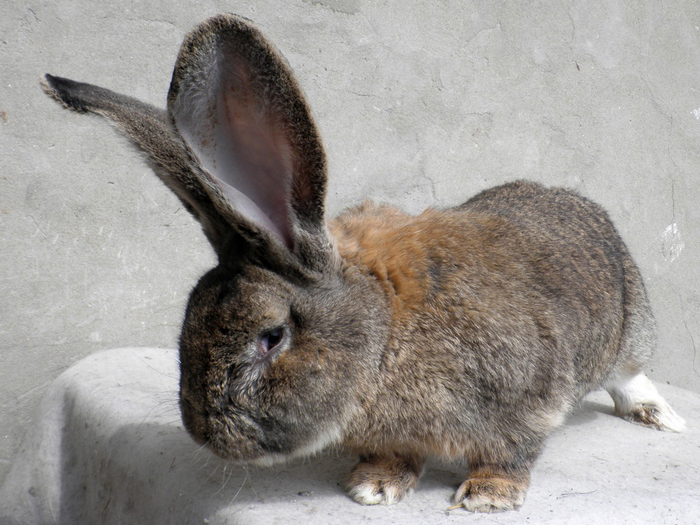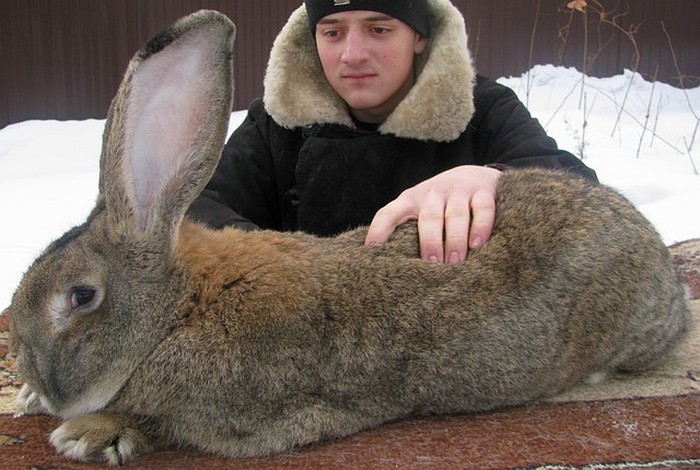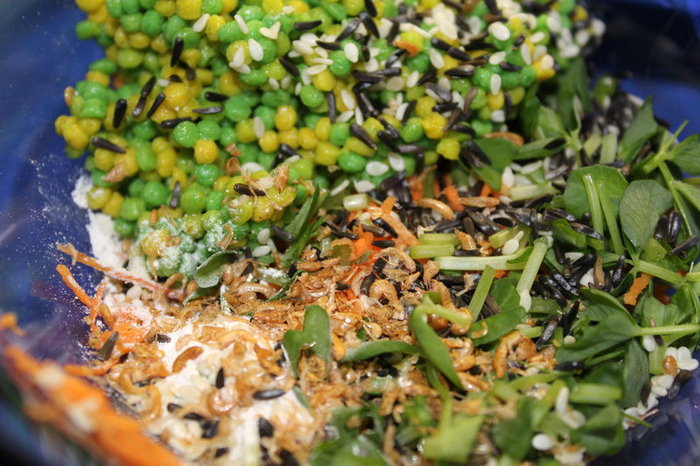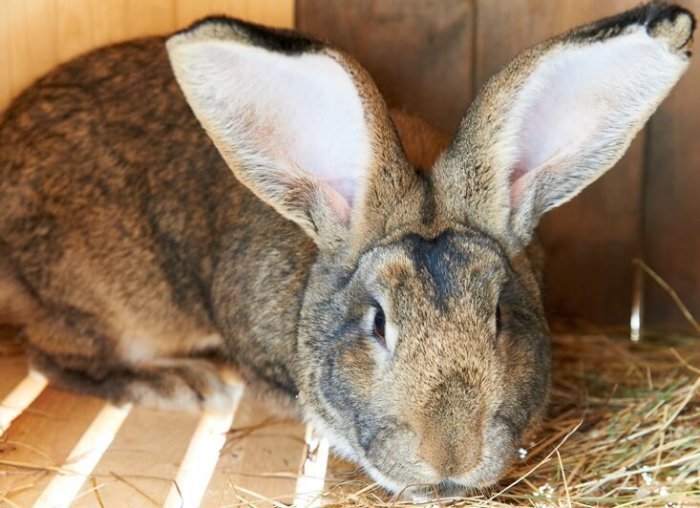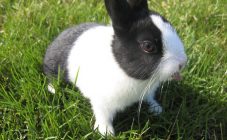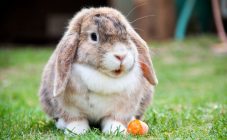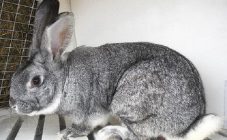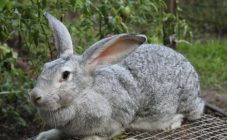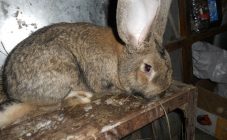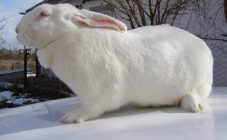Content:
At the end of the 19th century, rabbits of the Flemish breed (popularly called the Belgian giant) were brought to Germany. German breeders, taking flanders as a basis, focused on increasing the weight of rabbits. The result is a new breed of Deutsche Riesen - the German giant. The name of the breed reflects the true size of the animals - the average weight of the Riesen rabbit reaches 10 kg.
Features of the breed
The main distinguishing feature of this breed is size, Riesen rabbits are by far the largest. The minimum weight is 6-7 kg, there are representatives weighing 14 kg. They have a massive body, well-developed muscles, a long body, powerful legs.
Detailed description of Risen rabbits:
- chest girth - about 42 cm;
- the head is large with large cheeks;
- ears are wide, straight, up to 20 cm;
- body length - 70-75 cm;
- the wool is dense, thick, up to 4 cm;
- the legs are straight, the back is wide, the region of the sacrum is powerful;
- different colors: gray, black, red, blue.
If the ad indicates that Riesen gold rabbits are for sale, you need to understand that we are talking about ordinary German giants. Gold, which means gold, is just a designation for a red color.
Rabbits of the Riesen breed are very clumsy and clumsy, they need large spacious cages, especially for cat rabbits. Breeders note the high intelligence and good-natured disposition of the representatives of this breed. They easily make contact with the owner.
A valuable quality is the tasty Risen rabbit meat, which is juicy and soft. It does not have the herbal aftertaste of some other rabbit breeds. The fur is of excellent quality, used for the manufacture of fur products.
Individuals become ready for mating only by 8-10 months. Moreover, in ordinary meat breeds, the breeding period begins at 5 months. Fertility is the same as in other rabbits, but young females produce few offspring. There may even be cases of a single baby being born.
How to choose a good rabbit
To have confidence in the breed of rabbits, it is better to buy them on farms engaged in breeding work. Individuals that were born in February-April are more suitable for breeding, since food in the spring is usually the best. It is not recommended to buy adult rabbits, the best age for purchasing is 3-4 months. The health of a rabbit is judged by the following characteristics:
- The mobility of the young animal is high. The sick animal prefers to lie down.
- Average fatness. An overweight rabbit will have problems with reproduction, thin, undernourished - poorly developed.
- The eyes are clean, clear.
- The coat is smooth, shiny, without bald spots.
- Ears without sores or damage.
- The bite must be correct, otherwise in the future the animal will have difficulties with chewing food.
- A healthy rabbit has a good appetite.
- A wide pelvis for a female is the key to successful lambing.
If there is a sick animal in the litter, experienced breeders do not advise buying rabbits from this litter. It cannot be ruled out that this is a contagious disease that will subsequently spread to everyone.
Features of the breed
The cages for such large rabbits as the Germanic giants need large ones. The minimum size is 100x70 cm, the breeding cage should be even larger - 170x110 cm, half a meter high.Juveniles and females can be kept together in several pieces, then the cage should be another 50 cm wider. In addition, Risens are well adapted to Russian climatic conditions and can be kept in open-air cages under a canopy, but freezing must not be allowed.
Cleaning of cages and changing of litter should be regular. The same applies to room ventilation. Risens do not tolerate high ammonia content. For representatives of this breed, a mesh floor is not suitable, because they form corns (pododermatitis) due to their high weight. You can add sawdust under the hay, then you will have to clean the cells a little less often.
TOfeedinge
For Risenov, the same food is suitable as for other breeds of rabbits. But its amount must correspond to the size of the animal. The best in terms of composition is considered to be a balanced factory feed for rabbits. It does not cause colic, and the content of vitamins and minerals is optimal. But such food is rare, apart from small packages in pet stores for decorative rabbits.
Rabbits eat well grain and hay, juicy feed. It is not recommended to give white cabbage. Experienced Rizen owners note that when rabbits are fed boiled potatoes with the addition of bran, weight gain is faster. In females with such a diet, an increase in milk is observed. The grass for the rabbits is mowed when the dew has melted. Care must be taken not to come across rotten places, otherwise Risen will have problems with digestion. A favorite delicacy of fluffy animals is a vegetable mash.
You can give rabbits a grain and vegetable mixture with the addition of bone meal. As a rule, the German giants do not need additional vitamin supplements. However, if a course of antibiotic treatment has been carried out, micronutrient deficiencies can be helped. The water in the drinker is changed daily. It is especially important to monitor the presence of fresh water in the lactating female, this affects the amount of milk. Drinking bowls need to be washed at every water change, regularly disinfected.
Possible diseases
The Rizens have good innate immunity, which allows them to resist many common diseases. However, some problems cannot always be avoided. Diseases of the following type are possible:
- Myxomatosis... The carriers of the infection are blood-sucking insects, and the infection can also be transmitted through contaminated feed, feeder or equipment. Changes of the following nature are observed: purulent discharge from the nose and eyes, increased body temperature, wheezing, the appearance of tumors.
- Coccidiosis... Infection of animals with parasites. At the same time, lethargy, lack of appetite, and increased thirst are observed. The rabbit is losing weight, the belly is swollen. In severe cases, convulsions begin, which end in the death of the rabbit. With timely treatment, the disease recedes within a month.
- Pasteurellosis... It can even be carried by humans. When infected, nasal discharge, refusal to eat, high fever, abscesses, diarrhea appear. Death occurs in 2-3 days.
- Stomatitis... Appears in young rabbits upon contact with a sick animal. Signs: drooling, mouth ulcers, plaque on the tongue. The animals cannot eat and die after 2 weeks.
- Rhinitis... A type of respiratory infectious disease. In case of illness, the rabbit rubs its face and nose, sneezes, purulent discharge appears from the nose.
Prevention of the above diseases consists in the timely cleaning and disinfection of cells, drinkers, equipment. At one and a half months of age, rabbits need to be vaccinated. At the first sign of infection, call a veterinarian.
Breeding rabbits of the Riesen breed
On an industrial scale, breeding of this species is almost not practiced in Russia due to the late maturity of the breed. Individuals about 10 months old are allowed into divorce. The best representatives are selected from different nests, the female is placed in the cage with the male for 20 minutes. Pregnancy is determined by palpation after two weeks.
The female cat is transplanted into a larger cage. The food is given enhanced, but care must be taken so that the rabbit does not get fat. Risena females rarely abandon their cubs, preferably minimal intervention. If you need to take the baby in your hands, they are first wiped with rabbit fluff. Rabbits grow more slowly than other breeds.
Breed advantages and disadvantages
The future owner needs to take into account the difficulties in breeding and keeping Germanic giants. There are not many of them:
- requires a lot of space, needs large cells;
- the readiness for breeding is late, at 10 months;
- rabbits grow slowly, therefore feed costs increase.
The breed has enough merits. The main thing is, of course, the large size of the representatives. Also, the German giants have other advantages:
- tasty meat and valuable fur;
- good immune system, resistance to certain respiratory diseases;
- adaptability to Russian climatic conditions;
- kind disposition and high intelligence.
Risen rabbits can take their rightful place, both in a large breeding farm, and in a private backyard. The main thing is to weigh the pros and cons and be ready for the manifestations of the breed's characteristics.
